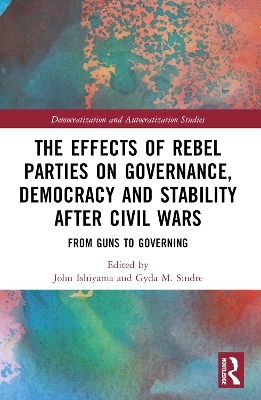
The Effects of Rebel Parties on Governance, Democracy and Stability after Civil Wars
Routledge (Verlag)
978-1-032-18409-8 (ISBN)
It examines different types of rebel groups, addressing the subject matter through the lens of three dimensions – democracy, stability and governance – which structure the book and the individual chapters. As such, it affords a rare opportunity to bring together two heretofore separate research traditions – conflict studies and political parties.
This book will be of key interest to scholars and students of political parties and party theory, civil wars and peacebuilding, democratization studies and state building and more broadly to comparative politics, development studies, and security studies.
John Ishiyama is a University Distinguished Research Professor of Political Science at the University of North Texas, USA. Gyda M. Sindre is an Associate Professor in International Politics at the University of York, UK.
1. Introduction: Rebel group inclusion and post-war democratisation Part 1: Rebel group inclusion and good governance 2. The Effects of Rebel Parties on Governance: Organizational Endowments, Ideology, and Governance after Civil Wars End 3. Dynamics of post-rebel party governance in Aceh and East Timor: Balancing patronage politics and popular democracy 4. From ‘Rebel Justice’ to the ‘Rule-of-Law’: The cases of Hamas and Hezbollah 5. The Struggle for Political Stability and Governance in Northern Ireland after the Peace Process: The role of Sinn Féin and the IRA 6. The KLA successor parties and the spoils of peace in Kosovo Part 2: Rebel group inclusion and democracy 7. How does the inclusion of post-rebel parties shape democracy? Parties, elections and peace in Mozambique, 1992-2018 8. The Political Integration of Islamist Armed Groups: A Viable Path to Peace and Democracy? 9. Adapting too well? Rebel reconversion and democratization in El Salvador 10. Post-War Ruling Parties and their Youth Wings: How Old Rebels handle the African Millennials 11. Rebel Participation and Political Transition in Post-War Sri Lanka Part 3: Rebel group inclusion and political stability 12. Political Parties in De Facto States: Links with External Patrons 13. The Ethiopian People’s Revolutionary Democratic Front: Coalition Dynamics and Post-War Politics 14. Contingency, Inclusion, and Democracy: A Critical Analysis of Jamyat-e- Islami in the Afghan State Building Process 15. Virtual Politics, post-Islamism and authoritarian Inertia in post-conflict Tajikistan 16. Conclusion: Towards a theory of rebel group inclusion and democratisation
| Erscheinungsdatum | 08.11.2022 |
|---|---|
| Reihe/Serie | Democratization and Autocratization Studies |
| Zusatzinfo | 6 Tables, black and white; 5 Line drawings, black and white; 5 Illustrations, black and white |
| Verlagsort | London |
| Sprache | englisch |
| Maße | 156 x 234 mm |
| Gewicht | 453 g |
| Themenwelt | Geisteswissenschaften ► Philosophie |
| Sozialwissenschaften ► Politik / Verwaltung | |
| Sozialwissenschaften ► Soziologie ► Makrosoziologie | |
| Sozialwissenschaften ► Soziologie ► Spezielle Soziologien | |
| ISBN-10 | 1-032-18409-4 / 1032184094 |
| ISBN-13 | 978-1-032-18409-8 / 9781032184098 |
| Zustand | Neuware |
| Informationen gemäß Produktsicherheitsverordnung (GPSR) | |
| Haben Sie eine Frage zum Produkt? |
aus dem Bereich


